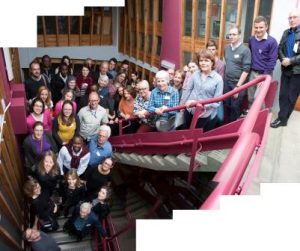This is a Call for Contributions for our second annual workshop.
Friday, 30th June 2017, University of Reading
From Big Data to Participatory Action Research: Participation for the 2030 Agenda for Sustainable Development
Participation Lab’s 2nd Annual Workshop
Supported by the University of Reading’s Participation Lab and Global Development Research Division, the Participatory Geographies Research Group of RGS-IBG, and Stockholm Environment Institute (York)
The 2030 Agenda for Sustainable Development is a global plan of action “for people, planet and prosperity”, encompassing both social and environmental concerns. Participation of all members of society is central to meeting and monitoring the 17 Sustainable Development Goals (SDGs). Participation in and for the SDGs is the focus of the Participation Lab’s 2nd Annual Workshop in 2017 (https://blogs.reading.ac.uk/participation-lab/).
There is a wealth of existing knowledge around innovative ways of engaging with community members and stakeholders at a range of scales, in a variety of socio-economic contexts, and with a diversity of methods from more passive big data approaches, to mass participation citizen science to participatory action research. This one day event will explore how methods across this spectrum of approaches can be used to meet and monitor the SDGs.
We want to bring together researchers and practitioners to explore how traditional and digital methods such as community engagement, participatory mapping, GIS, digital art, photography and video, online games, interactive web platforms, social media among others, might be combined with crowdsourcing and citizen science approaches to advance progress on the Goals and what innovations might be required.
The programme for our one-day event will be designed by you. We are seeking contributions from academics, practitioners, policymakers and community members in the form of 15 minute presentations, addressing the question of participation and sustainable development. Topics might include, but are not limited to:
- SDGs and development
- SDGs in global North and South
- Contributory, collaborative or co-created citizen science
- Citizen science approaches for development
- Participatory research methodologies, incl. mapping, GIS, art, photography,
- Participatory Action Research
- Big data
Already confirmed: a workshop around the ethics of engaging people in citizen science and participatory methods in global South contexts.
Please submit the following by Monday 20th March 2017 to Hilary Geoghegan h.geoghegan@reading.ac.uk:
- Your name, affiliation, career stage, email address
- Max. 250 word synopsis of your presentation
- Max. 100 word biographical statement
The organising committee (Hilary Geoghegan (Reading), Rachel Pateman (SEI, York), and Sarah West (SEI, York)) intend to confirm the programme by Monday 10th April 2017.
*******
The Workshop forms the opening day of the Participatory Geographies Research Group (RGS-IBG) Away Weekend in Reading. Details below.
Participatory Geographies Research Group Away Weekend – June 30th – July 2nd
We would like to invite you to attend the 2017 Participatory Geographies Away Weekend. This year it will be held in Reading, at the start of July. It will run from the morning of Friday 30th June to midday Sunday 2nd July 2017.
PYGYRG are co-hosting the event with the Participation Lab at Reading University (https://blogs.reading.ac.uk/participation-lab/). The Participation Lab will run a one day workshop on the theme of Participation for the 2030 Agenda for Sustainable Development: Digital technologies and innovation on Friday 30 June. PYGYRG will then host the weekend events at the Reading International Solidarity Centre (http://www.risc.org.uk/). Further details below.
The PYGYRG weekend away is a space in which we explore how we do our research and teaching. It is organised and led by participants. We tend to structure workshops around issues raised by people coming or run by people willing to share their skills and experience. It is as much about solidarity around doing radical research in the academy as it is around particular research methods. It is a space for thoughtful constructive discussions, meeting each other and having fun.
Basic information:
- Costs – There is a fee of £25 per attendee to cover the cost of room hire and basic food.
- Accommodation – will be available at Reading University Halls of Residence. This needs to be booked by individuals through the University website (http://www.universityrooms.com/en/city/reading/home). Please liaise with PyGyRG prior to booking.
- Food – We will mostly prepare this together, but we might also eat a meal out one evening
- Bursaries – we can provide up to 8 bursaries of up to £80 to cover accommodation costs and/or contribute towards travel costs for early career postgraduate, practitioners and unwaged participants. To apply for bursary please email sth31@cam.ac.uk by 25th February 2017 detailing (i) whether you plan to attend the Friday Participation Lab workshop, the weekend activities, or both; (ii) why you would like to attend; and (iii) why you need the bursary (maximum 1 page A4).
Further details about the weekend, including the Participation Lab workshop, will be advertised nearer to the time.
About us
PyGyRG is a collective whose members aim to raise the profile and perceived value, and further the understanding and use of participatory approaches, methods, tools and principles within academic geography and beyond:
- The participatory geographies research group is a broad and inclusive collective of academics and non-academics who value and practice participatory approaches, principles and methods.
- These participatory methods include a broad variety of tools alongside critical analysis of their utility, limitations and development.
- A participatory approach in academic geography includes collaborating with others as partners in improving equality, justice, and other progressive social change causes.
- We aim to work across all spaces and places, alongside attempts to widen participation in higher education geography.
- We support work that results in social change outside the academy and thus seek to widen the range of what are considered to be legitimate geographical knowledge and research activities.
- We aim to provide a space for mutual support orientated towards those engaging in participatory approaches, especially for those working within the increasingly pressured and competitive higher education context.
For further information see our website, http://www.pygyrg.co.uk/about-us/

